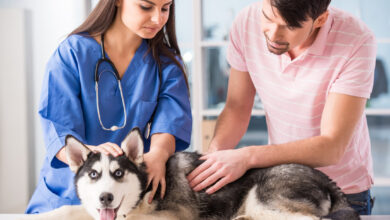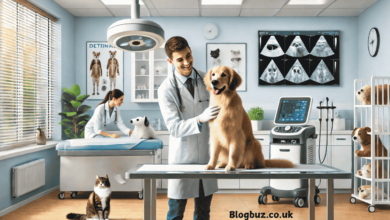Emergency Care for Senior Pets: Recognizing the Signs and Acting Quickly

Aging pets need extra care, especially during emergencies. Recognizing the signs early can save their lives. In this article, we’ll explore common emergency situations in senior pets, how to respond, and when to seek professional help. If you’re looking for trusted experts, consider veterinary services designed for geriatric animals.
Understanding Geriatric Pet Emergencies
As pets grow older, their bodies become more fragile. Their immune systems weaken. Reactions to trauma or illness may slow. Emergency situations in senior pets are different from those in younger ones.
Many owners don’t recognize emergencies quickly. That delay can be fatal. Let’s break down some of the most common urgent health issues in aging pets.
Stroke Symptoms in Older Pets
Strokes in dogs and cats often go unnoticed. They don’t look the same as in humans. However, quick action is critical.
Signs to Watch For:
- Sudden loss of balance
- Circling in one direction
- Head tilt
- Abnormal eye movement
- Sudden collapse
These symptoms appear out of nowhere. If your pet shows any of them, seek immediate help. The cause may be a blood clot or brain hemorrhage.
Sudden Weakness or Collapse
Senior pets may collapse without warning. This can result from various causes — heart problems, internal bleeding, or metabolic issues.
Emergency Indicators Include:
- Dragging legs
- Difficulty standing
- Labored breathing
- Pale gums
- Extreme fatigue
Don’t wait it out. This isn’t just old age catching up. It’s a signal that something’s wrong inside. A quick visit to emergency veterinary services is essential.
Cognitive Dysfunction and Disorientation
Older pets can suffer from cognitive decline. This pet “dementia” brings behavioral changes that sometimes mimic emergencies.
Common Behaviors:
- Wandering aimlessly
- Not recognizing familiar people
- Getting stuck in corners
- Toileting inside
- Night-time restlessness
Though not always urgent, sudden or extreme changes warrant evaluation. They could indicate brain tumors, infections, or toxins.
Why Immediate Veterinary Care Matters
Delaying treatment can lead to irreversible damage or death. Senior pets do not recover as easily. Acting quickly can mean the difference between life and death.
When in doubt, trust your instincts. Call your vet or visit an emergency clinic. Use professionals who understand the complex needs of senior pets. Quality veterinary services are tailored for these situations.
Other Emergencies to Watch For
Respiratory Distress
Older pets with heart or lung issues can develop breathing problems quickly. Look for rapid panting, open-mouth breathing in cats, or blue gums.
Seizures
One seizure in an older pet may be manageable. Cluster seizures or new-onset seizures are emergencies. Seek help at once.
Pain or Lameness
Senior pets often have arthritis. But sudden yelping, limping, or refusal to move may indicate fractures, joint dislocation, or cancer.
Loss of Appetite or Vomiting
Skipping meals might seem normal, but for an older pet, it’s not. It could be kidney failure, liver disease, or pancreatitis.
Bloated Abdomen
If your dog’s belly swells rapidly, rush to the vet. Bloat is deadly. Time is critical.
First Aid Tips Before You Reach the Vet
- Stay Calm: Pets sense panic. Speak gently and act confidently.
- Keep Them Comfortable: Place them on a soft surface. Minimize movement.
- Control Bleeding: Use clean towels to apply pressure to wounds.
- Monitor Breathing: If they stop breathing, perform CPR if trained.
- Avoid Food or Water: It might worsen the situation or delay surgery.
Always call the vet before you arrive. It allows the clinic to prepare and gives you guidance during transit.
Creating a Senior Pet Emergency Plan
Preparation can prevent chaos during a crisis. Here’s what every senior pet owner should do:
- Know the Nearest Emergency Vet: Save the address and phone number.
- Keep a Pet First Aid Kit: Include gauze, antiseptic, tweezers, and a thermometer.
- Maintain Medical Records: Keep them in one place for quick access.
- Understand Their Baseline Health: Knowing what’s “normal” helps you spot problems faster.
Choosing the Right Veterinary Service
Not all clinics are equal when it comes to senior pet care. Look for a provider that specializes in geriatric animals.
Veterinary services like these offer:
- On-site diagnostics
- Emergency response teams
- Senior-specific treatment plans
- Compassionate, experienced staff
The right team understands the emotional bond between aging pets and their owners. They handle emergencies with urgency and empathy.
Support, Knowledge, and Care for Senior Pets
Older pets give us years of loyalty. In return, we owe them protection, especially in emergencies. Their bodies may slow down, but their love stays strong.
Knowing how to act during a health crisis can save your pet’s life. Recognize the signs. Stay alert. Respond quickly. And partner with trusted veterinary services that focus on elder animal care.
Never ignore changes in behavior or health. Even subtle shifts can signal deeper problems. Your quick decision today can give your pet many more happy tomorrows.
Emotional Impact of Senior Pet Emergencies on Owners
Dealing with emergencies in older pets can be emotionally overwhelming. These pets are often lifelong companions, and seeing them in distress is heartbreaking. The uncertainty, combined with the urgency of the situation, leaves many owners feeling helpless. That’s why it’s important not just to rely on medical support, but also to seek emotional guidance and reassurance from professionals who understand the human-animal bond. Clinics that offer compassionate care help both pets and owners navigate these tough moments with dignity and understanding.
Preventive Care Reduces Emergency Risks
While not all emergencies are avoidable, proactive health monitoring can reduce their frequency. Regular checkups, blood work, and senior wellness screenings help detect issues early before they escalate. Adjusting diet, exercise routines, and managing chronic conditions like arthritis or heart disease also plays a big role. Partnering with reliable veterinary services for preventive care gives your pet the best chance to age gracefully, comfortably, and with fewer crises.
Final Thoughts
Caring for a senior pet means staying prepared. Emergency situations arise when least expected. But with the right knowledge, tools, and partners, you can handle them confidently.
Don’t wait. Create an emergency action plan today. Ensure your vet is just a call away. Your pet’s life could depend on it.




